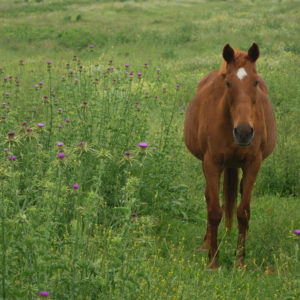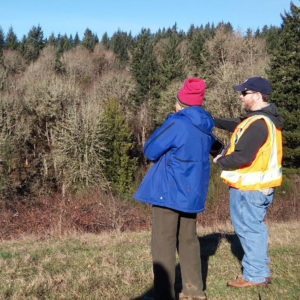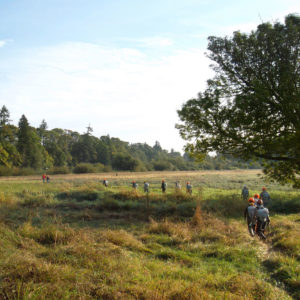 The WeedWise program is working to improve the management of invasive weeds across Clackamas County. Since inception in 2009, the WeedWise program has sought to preserve the social, economic, and ecological integrity of Clackamas County by preventing the unchecked spread of invasive weeds, and by working to actively control existing infestations. The focus of this effort has been to provide assistance and technical information to local landowners, and by implementing landscape level management practices to target priority invasive weeds across Clackamas County.
The WeedWise program is working to improve the management of invasive weeds across Clackamas County. Since inception in 2009, the WeedWise program has sought to preserve the social, economic, and ecological integrity of Clackamas County by preventing the unchecked spread of invasive weeds, and by working to actively control existing infestations. The focus of this effort has been to provide assistance and technical information to local landowners, and by implementing landscape level management practices to target priority invasive weeds across Clackamas County.
Why should you care?
Invasive weeds can have a negative impact on us in a variety of ways. Invasive weeds are known to:
- Displace native vegetation
- Reduce crop yields
- Harm fish and wildlife
- Adversely affect human health
- Damage property and infrastructure
- Reduce forage for livestock and wildlife
- Decrease property values
- Increase erosion
- Decrease water quality and quantity
- Limit land use
- Disrupt ecological processes
By preventing weeds from spreading and by actively controlling known infestations, we can minimize the impact of invasive weeds.
Invasive weeds are a form of biological pollution.
 Invasive weeds degrade the quality of our land and convert properties into new sources of biological pollution. Unlike other sources of pollution, invasive weeds continue to grow and expand, long after the plants are first introduced. As such, it is important to control and prevent the spread of invasive weeds, or plants will continue to spread causing ever-increasing damage to our communities. By controlling invasive weeds, we not only eliminate the current infestation but also prevent the establishment of additional infestations.
Invasive weeds degrade the quality of our land and convert properties into new sources of biological pollution. Unlike other sources of pollution, invasive weeds continue to grow and expand, long after the plants are first introduced. As such, it is important to control and prevent the spread of invasive weeds, or plants will continue to spread causing ever-increasing damage to our communities. By controlling invasive weeds, we not only eliminate the current infestation but also prevent the establishment of additional infestations.
Invasive weeds come at a cost.
It has been estimated that weeds have a total direct and indirect impact of 143 billion dollars per year within the United States. Within the state of Oregon the cost associated with just the twenty-five noxious weed species costs the residents of Oregon $83.5 million dollars a year with estimated damages growing to $1.8 billion annually to Oregonians if these invasive weeds were left unchecked. These losses are absorbed by all of us through increased food costs, increased costs of natural resources, reduced productivity, higher taxes, and decreased property values. These economic impacts clearly demonstrate the potential benefits to be realized from controlling invasive weeds.
Invasive weeds can have a profound impact on our natural areas.
Weeds displace diverse native plant communities and replace them with weedy monocultures. This expansion of weed populations alters natural processes and disrupts complex food webs adversely impacting fish and wildlife. The result is a loss in diversity that leaves behind a landscape that is much less productive and less resilient to changing conditions. Invasive weeds ultimately result in a landscape that is homogenous and less like the Oregon that we know and love.
What we are doing
In our efforts to prevent and control the spread of invasive weeds, the WeedWise program has three primary focus areas consisting of Service & Assistance, Assessment & Prioritization, and Invasive Weed Management. These three focus areas provide a framework for increasing the efficiency and effectiveness of our invasive weed management efforts across Clackamas County.
Service & Assistance
 Our Service and Assistance initiative is focused on helping local landowners to improve management on their property. The requests by landowners for invasive weed assistance are high and have grown each year since inception of the WeedWise program. Invasive weeds are one of the most common resource concerns cited by landowners requesting technical assistance to the Clackamas Soil and Water Conservation District. As such, the WeedWise program is actively working to address the growing needs of landowners.
Our Service and Assistance initiative is focused on helping local landowners to improve management on their property. The requests by landowners for invasive weed assistance are high and have grown each year since inception of the WeedWise program. Invasive weeds are one of the most common resource concerns cited by landowners requesting technical assistance to the Clackamas Soil and Water Conservation District. As such, the WeedWise program is actively working to address the growing needs of landowners.
The WeedWise program first serves as a source for technical assistance to landowners. We are available to answer your questions about invasive weeds and weed management. Whether it is a phone call, email, hotline report or walk-in we do our best to help develop working solutions for Clackamas county residents.
The Weed Wise program also regularly offer trainings and presentations to groups and community organizations events related to invasive weed identification, reporting and control. If you are interested in having us discuss invasive weed with your group please contact us today.
Landowners may also receive assistance from the WeedWise program when working on a Clackamas Soil and Water Conservation District conservation plan. Many conservation practices require active management of invasive weeds. The WeedWise program routinely assists in conservation plan development and implementation.
To help with your invasive weed control efforts we also maintain Weed Equipment Library of tools that we make available to Clackamas County residents at no cost. These are a great resources to help in the removal of invasive shrubs and small trees. So contact us to reserve yours today
Assessment and Prioritization
Controlling invasive weeds can be a big undertaking. The approach of the WeedWise program is to maximize our impact and benefit to the citizens of Clackamas County. This process involves assessing our management practices to increase our efficiency and effectiveness. The WeedWise program addresses these issues through landscape level evaluations of weed distributions, invasive species risk, and the social, economic, and ecological benefits of management.
To improve our effectiveness the WeedWise program routinely surveys for invasive weeds and maintains a database of known locations to help direct our activities. These weed locations are documented in cooperation with public and private land owners and land manager across the region. We also share this information with regional land managers in conjunction with Oregon iMapInvasives and Oregon WeedMapper to help direct efforts region-wide.
In conjunction with our invasive weed surveys we also carry out evaluation and assessments of invasive weeds, to look at their potential impact, ease of control, and the benefit from management. This activity is undertaken in conjunction with partners from the 4-County Cooperative Weed Management Area and the Columbia Gorge Cooperative Weed Management Area. These assessments allow us to identify local needs and priorities to statewide noxious weed assessments undertaken by the Oregon State Weed Board. and Washington State Noxious Weed Control Board .
The WeedWise program also looks at the quality of our lands and the potential for loss if weeds are left unchecked. This site assessment process includes considerations related to the quality of green spaces and natural areas, the proximity to farm lands and natural resources, recreation and tourism uses, and the relative susceptibility of lands to invasion.
Collectively, the WeedWise program uses this information to develop a list of priority weeds to target for our Rapid Repsonse weed control efforts. It also lets us prioritize areas of the county to target for invasive weed control efforts.
Invasive Weed Management
 The implementation of on-the-ground invasive weed control efforts is a primary focus of the WeedWise program. This process maximizes the benefit to Clackamas County by implementing more effective and efficient strategies to address priority weed species and to protect priority areas. Management practices focus on cooperation with local and regional partners to affect large scale benefits from invasive weed management.
The implementation of on-the-ground invasive weed control efforts is a primary focus of the WeedWise program. This process maximizes the benefit to Clackamas County by implementing more effective and efficient strategies to address priority weed species and to protect priority areas. Management practices focus on cooperation with local and regional partners to affect large scale benefits from invasive weed management.
The most important partner that the WeedWise program is are our private landowners. We routinely work local landowners to arrange permissions to access and treat on private property. landowners many be contacted through mailings or onsite visits. Once enrolled, the WeedWise program will work with landowner to treat priority noxious weeds using WeedWise staff and professional weed control contractors to treat infested weeds often at no cost to affected landowners. So many thanks to all of our cooperating landowners!
In addition to our Rapid Response invasive weed control efforts, we also work with the Oregon Department of Agriculture, Biological Control Program to ensure the safe redistribution of approved biological controls. These biological controls help to control invasive weeds throughout the state at little to no cost to local landowners, and help to target many of our most common and damaging weeds.
lastly, since invasive weeds ignore political and jurisdictional boundaries, the WeedWise program also works closely with regional partners to address invasive species across our boundaries. Visit our Partnerships page to learn more about our regional partnerships and coordination.
